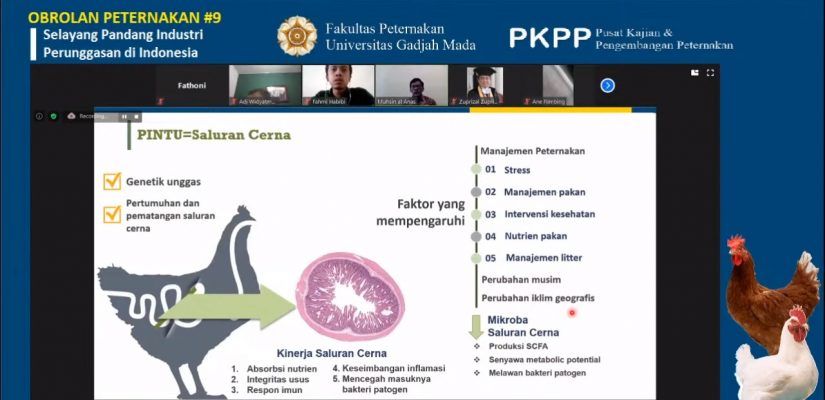
In the midst of rapid technology in the field of poultry, protection of smallholder poultry farms is still faced with various challenges. Government policy is one of the factors that makes poultry farmers even more overwhelmed.
This was said by Ir. Adi Widiatmoko, Marketing Consultant of PT Cheil Jedang Super Feed in the Obrolan Peternakan (OPERA) on Wednesday, September 2, 2020 via Zoom. Adi said that government policies on stopping corn imports, prohibiting the Antibiotic Growth Promoter (AGP), and permitting commercial poultry cultivation by manufacturers of up to 2% are considered burdensome for poultry farmers.
“In 2015, the government stopped importing corn which caused the price of corn to rise. This was made worse because the import was stopped in October when there was no harvest. As a result, the price of corn rose drastically. Then, in 2018 the government banned the use of AGP which caused a high risk of death and decreased performance, the presence of necrotic enteristik and dysbacteriosis (a disease caused by bacteria), wet litter, and increased production costs. Meanwhile, replacing AGP is very expensive and will make it difficult for breeders,” said Adi.
Adi revealed that the government needs to be careful in making policies because so far it has been more pro-consumers. The government should make policies that are also profitable for breeders.
“Another factor that makes it difficult for breeders is a change in supplier strategy in the form of changes in raw material formulated by the feedmill which will have a significant effect on farmers. In addition, frozen shops, which are currently selling products below normal prices, will also put pressure on breeders,” said Adi.
Adi added that the old NPP registration and SNI were also burdensome for breeders. This makes feed innovation difficult and production costs expensive because local sources are not available.
Even so, Adi revealed that there were significant improvements that could support business investment for the next 5 years, namely controlled economic stability, conducive political conditions, maintained inflation, and population growth.
Prof. Dr. Ir. Zuprizal, DEA, IPU., ASEAN. Eng, a lecturer at Faculty of Animal Science UGM who was also a guest speaker at the event said that the prohibited use of AGP could be replaced with a feed additive that uses nano technology which he has developed in the laboratory.
“The problem of poultry feed is more complicated when compared to other animal feed problems. This is due to several factors, namely the digestive process runs faster, breathing time and blood circulation is faster, body temperature is 4-50C higher (410C), moves more actively, is more sensitive to environmental influences, grows faster, mature faster, and high egg production. Feed costs reach 70% of the variable cost of production. Therefore, poultry need sufficient nutrients so that growth and maintenance of the body and production remains good,” said Zuprizal.
The nanotechnology used by Zuprizal in his research is to reduce the particle size of the feed additive that will be given. Nano technology is a technology that studies objects that are 10-9 or 1/1 billion in size.
Zuprizal develops nano encapsulation for solid materials, such as turmeric. The turmeric is cut, dried, and ground until smooth and then given to the chicken. At this stage, the various substances in turmeric if it is extracted are curcumin. Curcumin can be used as an antibiotic but if given alone it can damage digestion so it is made nano encapsulation.
“This feed additive will be put into drinking water for poultry. With a small particle size, it will be absorbed and interacted quickly in the body,” explained Zuprizal.
Another speaker, Dr. Muhsin Al Anas, S.Pt., a lecturer at FAS UGM, said that the performance of the digestive tract determines the productivity of poultry. Disorders that cause the performance of the intestines or digestive tract is not optimal due to toxic compounds such as mycotoxins and an increase in pathogenic bacteria.
“Pathogenic bacteria produce toxic compounds such as Lipopolysaccharide (LPS) which are harmful to livestock. The presence of mycotoxin and LPS compounds causes the growth of intestinal villi is not optimal, and even causes intestinal inflammation. Finally, the utilization of nutrients is not optimal and there is a decrease in livestock production,” said Muhsin.
The addition of feed additives is important to improve digestive performance so that nutrient absorption can be maximized. Feed additives that can be added include essential oils, acidifiers, toxin binders, enzymes, and anti-microbial peptides.
